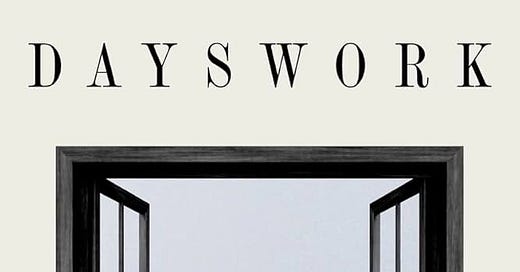Chris Bachelder and Jennifer Habel, Dayswork
shudder-inducing prose slabs & life-justifying doodles
“‘This tender sketch of his two daughters walking up a hill justifies Melville’s life,’ according to not anyone at all.”
One peculiarity of book-lovers — something that distinguishes us, from, say ice cream connoisseurs or airplane obsessives — is that we want less of our beloved. We are relieved when we come to the end of a novel, as no one is ever relieved to come to the bottom of a pint of mint chip.
You might say, Yes, well, of course we want our books judiciously pruned, in the “I would have written a shorter letter but I did not have the time” sense — and we do — but I’m talking about something stranger. Even in a novel that has been brilliantly shorn of all that is extraneous, a novel that we are loving, when we turn a page and encounter two unbroken slabs of prose, something in us shudders. And when we turn a page in that same novel and see the creamy blank holiday of a chapter-ending — an ending that brings us ever closer to the moment when this wonderful novel will be out of our lives entirely — a childish something in us rejoices.
For this childish something there exists a genre of a novel in which the workweek never really begins: the novel written with multiple paragraph breaks on every page. Jenny Offill’s Department of Speculation is one such space-studded book. David Markson made a whole career out of them. Quite often these books brim with curious bits of trivia (W.H. Auden was once arrested for urinating in a public park in Barcelona), each of which stares provocatively out at us from its typographic island. Usually the narrator’s story, such as it is, dribbles out piecemeal between the torrents of fact. And we (pleased as we are at having finished a book) are left with the slightly troubled emptiness of the person who has just eaten an entire tub of kettle-corn.
Just this week, however, I’ve read a space-studded novel that has left me well and truly sated: Chris Bachelor and Jennifer Habel’s Dayswork. You will finish it in only a couple of days; you will hassle your nearest and dearest about it for an eternity.
Dayswork is narrated by an unnamed woman who has, during the early, grocery-disinfecting days of the pandemic, become obsessed with Herman Melville. We learn about the controversy surrounding Melville’s height (was he 5’10”, as it says on his passport application, or 5’8”, as on a ships’ crew list?). We learn about the time that he ate an entire “bag of oranges in front of his child, sharing none.”
My husband says that I seem to have contracted Melville, and it’s true that some mornings we find one of my crumpled sticky notes in the sheets like a used tissue.
So far we are firmly in David Markson land: literary trivia recounted with a cocked eyebrow. But what distinguishes Dayswork from its spacious brethren is how non-trivial, how urgent and baleful, the Melville-anea quickly begins to feel. Because the narrator is not merely recounting the long crisis that was Herman Melville’s life; she is fending off a crisis in her own life. And Melville is both the shield with which she is doing that fending — and the weapon she keeps expertly steering toward her own viscera.
There was a time — we’ve come to call it the Bad Time — when my husband went far away in our small house, the Cape Cod by the field.
Something happened between the narrator and her husband (may still be happening), the book keeps darkly reminding us. And Melville’s suffering (because of his career catastrophes, because of his possibly unrequited love for Nathaniel Hawthorne) becomes the narrator’s suffering, in the way that a car alarm can, in a dream, transform into an advancing tank. The pandemic here is presented not merely as a public health event — basement quarantines and Zoom P.E. classes — but as a kind of multi-month dark night of the soul, during which one’s life, in all its haphazardness and inadequacy, presses down like a weighted blanket.
The narrator returns, again and again, to something that the critic James Wood said about Moby-Dick: that it “justifies Melville’s life.”
James Wood was thirty-one when he took the measure of Melville, declaring that Moby-Dick justified its author’s life.
Herman Melville happened also, the narrator points out elsewhere, to be thirty-one when he wrote Moby-Dick. The narrator’s age — forty-nine — lies beneath these neutral facts like an inflamed boil, un-pierced.
And then, many pages later, the narrator is describing a letter that Melville — Moby-Dick now far behind him — wrote home from a voyage on a clipper ship. Melville included in the letter a note to his young daughters, Fanny and Betsy, and a drawing of the two of them, holding hands.
And the narrator writes:
“This tender sketch of his two daughters walking up a hill justifies Melville’s life,” according to not anyone at all.
The boil is pierced — and my love for this book is secured. Because Bachelder and Habel have here used the form of an academic citation to detonate the entire maddening artifice of academic citation. Why shouldn’t an affectionate doodle in the margins weigh as much, on the cosmic scales, as a novel about a whale? What would it even mean, to justify a life? Justify it to whom? The narrator making vegetarian enchiladas and falling asleep beside her husband and working on her book; Herman Melville eating oranges and writing to his family and working on his book — in the light of this sentence they are all seen to exist on a single behavioral plane, neither life-justifying nor non-life-justifying but simply life. It’s surprising and repetitious, delightful and harrowing, novelistic and incomprehensibly trivial. We’ll be sad when we come to the end of it.





I am in awe of how well you explain these peculiar phenomena (ie. the joy of finishing a book you love) that one thinks only happens to them. It’s why I fell in love with reading to begin with. Also I am a huge fan of Department of Speculation and, ever since This is How You Lose the Time War, possibly novels written by two people. I’m definitely going to check this one out. Thank you as always. I am never glad to come to the end of your posts.